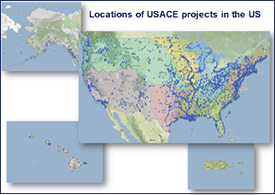
As the largest and oldest Federal water resources management and military support agency in the nation, the U.S. Army Corps of Engineers oversees and administers public water resources and associated infrastructure in every state, as well as several international river basins.
ALEXANDRIA, VA – September 7, 2011. The U.S. Army Corps of Engineers considers the global changes that can result in regional and local impacts, and the design, engineering, and management of responses to those changes, as the major challenges of the 21st century. These dynamic global changes include changes in demographics, in land use/land cover, in the rate of world population growth, in the state of aging infrastructure, in global persistent conflict, in declining biodiversity, in increasing globalization, in changing social values and economic conditions, and in changing climate.
On June 3, 2011, Ms. Jo-Ellen Darcy, Assistant Secretary of the Army for Civil Works, submitted the USACE Climate Change Adaptation Plan and Report 2011 to the Executive Office of the President’s Council on Environmental Quality (CEQ). The report was a response to the CEQ’s Implementing Instructions for Federal Agency Climate Change Adaptation, issued on March 4, 2011. IWR’s Kate White, PhD, PE and Jeff Arnold, PhD were leading authors on the report.
The report outlines 21st Century challenges arising from climate change, guiding questions for high-level vulnerability assessment, and USACE climate change adaptation planning and implementation strategies. The U.S. Army Corps of Engineers recognizes the very significant differences between climate change adaptation and climate change mitigation in terms of physical complexity, fiscal and material resources, level of knowledge and technical readiness, and temporal and geographic scale. Because of these differences, understanding and implementing climate adaptation policies and measures requires very different knowledge, skills, and abilities than implementing mitigation measures. As a result, the Chief, Engineering & Construction will serve as the head of the agency’s Adaptation Steering Committee.
In mainstreaming adaptation, the USACE goal is to develop practical, nationally consistent, legally justifiable, and cost effective measures, both structural and nonstructural, to reduce vulnerabilities and improve the resilience of our water resources infrastructure impacted by climate change and other global changes.
"We believe that all of these activities will help us to identify changes, whether singly or in combination, that will impact water resources infrastructure performance and reliability, so we can proactively take action to reduce our risks and adverse consequences," said Steve Stockton, Director of the USACE Civil Works program. "Many of the lessons learned in adapting to climate change leave us in a better position to act effectively in the face of other global changes."
The U.S. Army Corps of Engineers oversees and administers public water resources and associated infrastructure in every state, as well as several international river basins. It is the largest and oldest Federal water resources management and military support agency in the nation.
Learn More